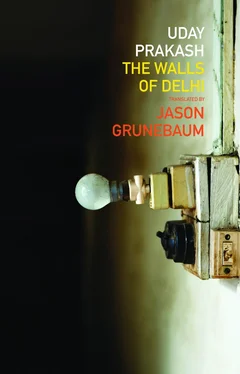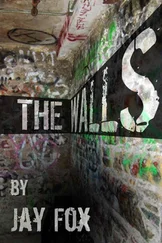Whenever I sat down and opened a book or tried to write something in those days, the full terror of my reality at home cast a long shadow. I saw strange, sinister hues on the faces of my wife and children that I couldn’t pinpoint or understand. Death, illness, penury, hearsay, and sorrow skulked through the house with heavy feet. At night sobbing sounds permeated the rooms and corridors. A cat screeched on the rooftop. The plaster was falling off the walls, and the doors opened and closed with a strange, sad groan.
It was also a time rife with illness: dengue fever, food poisoning, the flu. My wife had a thyroid problem, and our younger son was so thin, so frail, so shy and introverted, that we were racked with doubt about whether he would be able to take care of himself in the future. Ginsberg’s ‘Howl’ and Muktibodh’s ‘In Darkness’ echoed in my head. I woke up ten times a night. I considered the possibility that I had been duped and driven onto a surreal landscape of terror and nightmares, where each work of the honest writer puts his family in a condition more critical, makes them more unsafe — reality substituted by the awful surrealism of a poem.
The twentieth century was turning into the twenty-first, and with each new work I wrote, my life was plunged more deeply into the abyss. Delhi, along with the rest of the world, was changing fast, other capitals even faster. Here, only one beacon remained that still had any power, and it attracted cruelty, barbarity, greed, injustice, money — no other options were possible. When I tried explaining my troubles to Delhi’s influential writers and thinkers, I felt as if I were a snail that had surfaced to the world above, telling the divine bipeds patting their fat bellies about his wild, weird, othercaste experiences from his home at the bottom of the sea. My language was incomprehensible. They viewed my utterances born of sorrow, vulnerability, and nerves with indifference, curiosity, wonder. They were of a totally different class. Their scraps were my meal. A poet had written something to that effect a few years ago, perhaps coping in similar circumstances.
In the middle of all this, I went one late afternoon to the general store in Vijaynagar where Chandrakant worked. The store was empty when I arrived, apart from Chandrakant, who I found lounging in the chair behind the counter singing an abhang devotional song. But there was a heartbreaking loneliness in his voice, as if he weren’t singing for others, but as a crutch to steady himself. The previous July when I had gone to Pandharpur in Maharashtra on a film project I was shooting, I had seen the Gyaneshwar and Namdev pilgrim and chariot processions coming from Alandi. While sitting on the steps of the Vithoba temple I heard the abhang songs. The rain had just stopped a few moments earlier, but dark, menacing clouds still covered the sky. The voices of the singers in the shade, drenched from the monsoon humidity, were like a salve soothing my loneliness and vulnerability. Like a cure that fills vessels with a new blood of life. That day standing in the doorway at the store in Vijaynagar, I felt as if I was on the steps of the Vithoba temple rather than in Delhi.
Chandrakant didn’t see me. His feet were stretched out on a stool in front of the chair, eyes closed, lost in the music.
‘What a voice! Are you Marathi?’ This was the first sentence I said to Chandrakant Thorat. He blushed.
‘Are you looking for something?’ This was the first sentence he said to me.
We introduced ourselves, and soon became friends. The two of us were trapped in our own respective hells. That first day I found out that he still hadn’t become a father, despite having been married for so many years, and that one after the next his children had died from mysterious illnesses, as if cursed. None lived longer than four months. His wife Shobha was shattered.
The next week I went to his home: the half flat in bylane number seven, Jahangirpuri. Some of Shobha’s hair had turned grey, and there was a hardness to her face, but she was still a beautiful woman. When she laughed, a softness sometimes peeked through. This, however, was rare. That night I listened to the whole story of their lives.
‘You are the god Vitthoba, coming as you did just as I was singing the abhang…!’ Chandrakant said, brimming with feeling. He assumed from my clothes and looks that I was a wealthy, connected, worldly man, capable of raising him out of the dark place where he was stuck. Chandrakant, Shobha, and the rest of the residents of bylane number seven for the most part came from one community. And I came from a different one. But my position in that community was no different from that of Chandrakant and others like him. There was no place for me in mine: I was nothing more than a mere writer. Many others came masquerading as writers, but I was the one shown the door.
We then met regularly. Chandrkant accompanied me to the Hasarat Nizamuddin Auliya shrine and sat on the marble floor where we quietly listened to the penniless qawwali singers sing their songs.
Mother! Let me go today!
Today is a day filled with colour
Festival of Colour, please let me go!
and
The path to the drinking well is very difficult
How can I fill my pot with nectar-water?
And I was amazed when one night after we’d had a little bit to drink in their Jahangipuri half flat, Chandrakant reprised the qawwalis. Shobha was busy cooking mutton dopyaza, and the sweet smell of her cooking filling the flat. He was drumming out the beat on empty plastic water bottles using two one-rupee coins; his rhythm was flawless. He was as mesmerised with his own music making as the qawwali singers had been with theirs. I began tapping out the rhythm on the empty stainless steel cup that I was drinking whisky from. Along with the exquisite smell of the mutton dopyaza and, combined with the qawwali music, our meditation on Hazart Nizzamuddin, mehboob-e ilahi — l’amoureux de la divinité — and the words of Amir Khusrau, we felt the darkness dissipate. The whisky, too, had lifted our spirits to the point that we were dipping and diving in a pool of enchantment. Tears streamed from Chandrakant’s eyes. He didn’t know that the writer of the qawwalis was the master of the dargah where the two of us had gone several times, and where Chandrakant, head covered by chador, prayed little prayers that his life might improve. He prayed at the tomb of a man he thought was a pir — a holy man — not a poet. It’s true that he was also a pir, the disciple of Auliya. We were there one night when, once again, it was nighttime in the world all around, and darkness blanketed us. The dawn of tomorrow was drowned out in the dark like doused candles. We were returning to our homes along the footpath with Amir Khusrau’s stick as our guide, groping in search of our life. Shobha, too, was with us, perhaps trying to find her own, silently. I couldn’t stop wondering, who are these people present in the language of Khusrau — the man who first gave birth to poetry — and how did so many of them suddenly get there?
I wasn’t able to see Chandrakant or Shobha for about a year after that night. Another book of mine came out during that time that chipped away further what tranquility I had left. Well-connected and high caste writers from Delhi, Bhopal, Lucknow and other major cities began calling me a rabid dog, fascist, copycat, thief, Naxalite, communalist, feudal, affluent. My newspaper column was dropped, payments cancelled, and the rumour mill spun out such awful stuff that I nearly went mad. They were dark days. My sleep was racked with nightmares. I felt as if my body, now skin-and-bones, was pushed up against the wall waiting for death in a solitary confinement cell in some labour camp, like Osip Mandelstam. Or sitting quietly on a chair in front of the Sharda mental hospital: a single grain of rice gets stuck in my windpipe, my breath grows erratic and I cast my eyes wildly around as my death approaches. Like the Hindi writer Shailesh Matiyani, who died in that hospital. Fascism was right in front of us with a new look. The power of illegal capital and criminal violence was hiding behind the veil of the great ideologies of the nineteenth and twentieth centuries, until it consumed and reduced to ash the great philosophies of the past two centuries in the irrepressible fire of its base ambitions and desires.
Читать дальше










